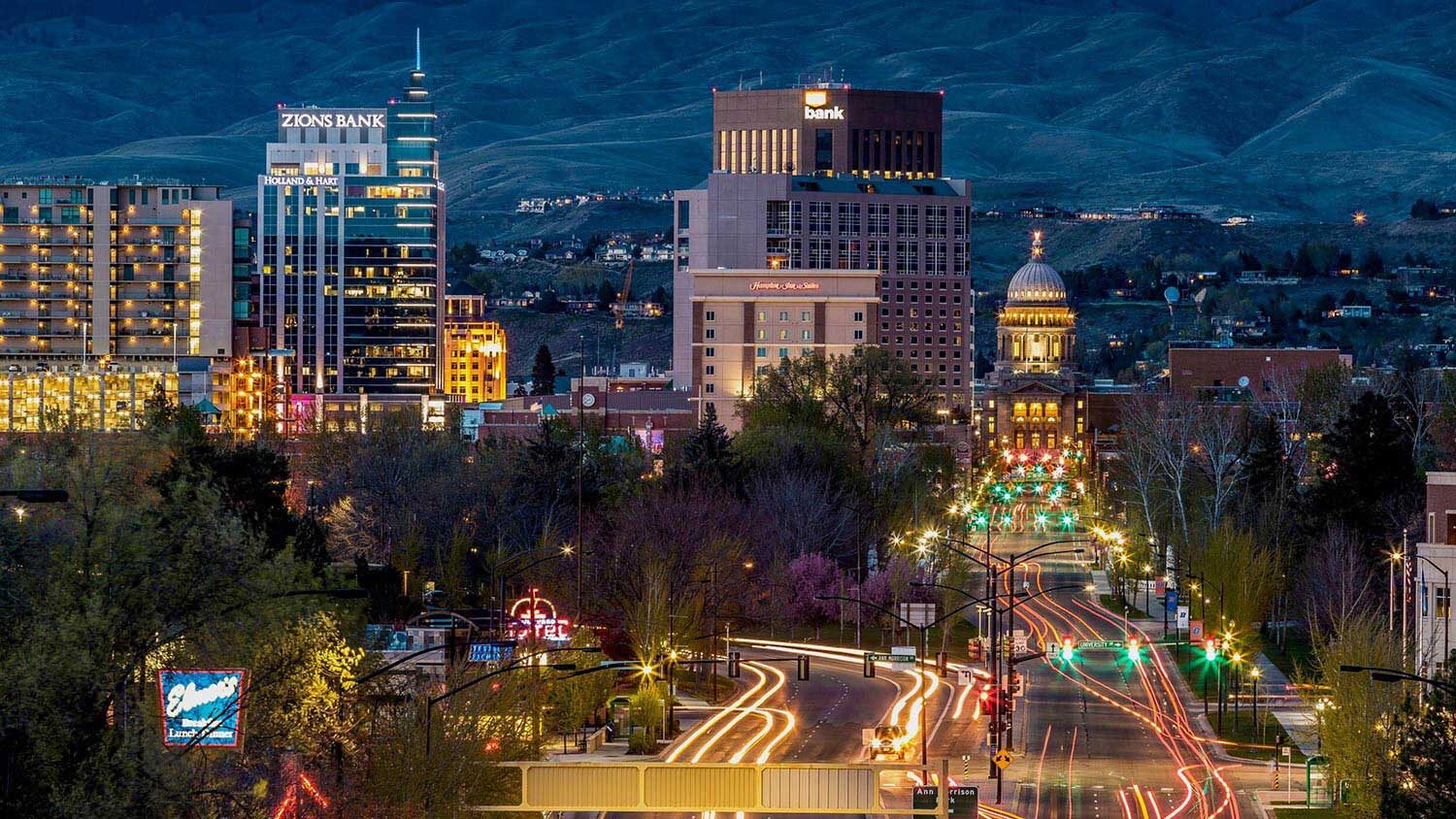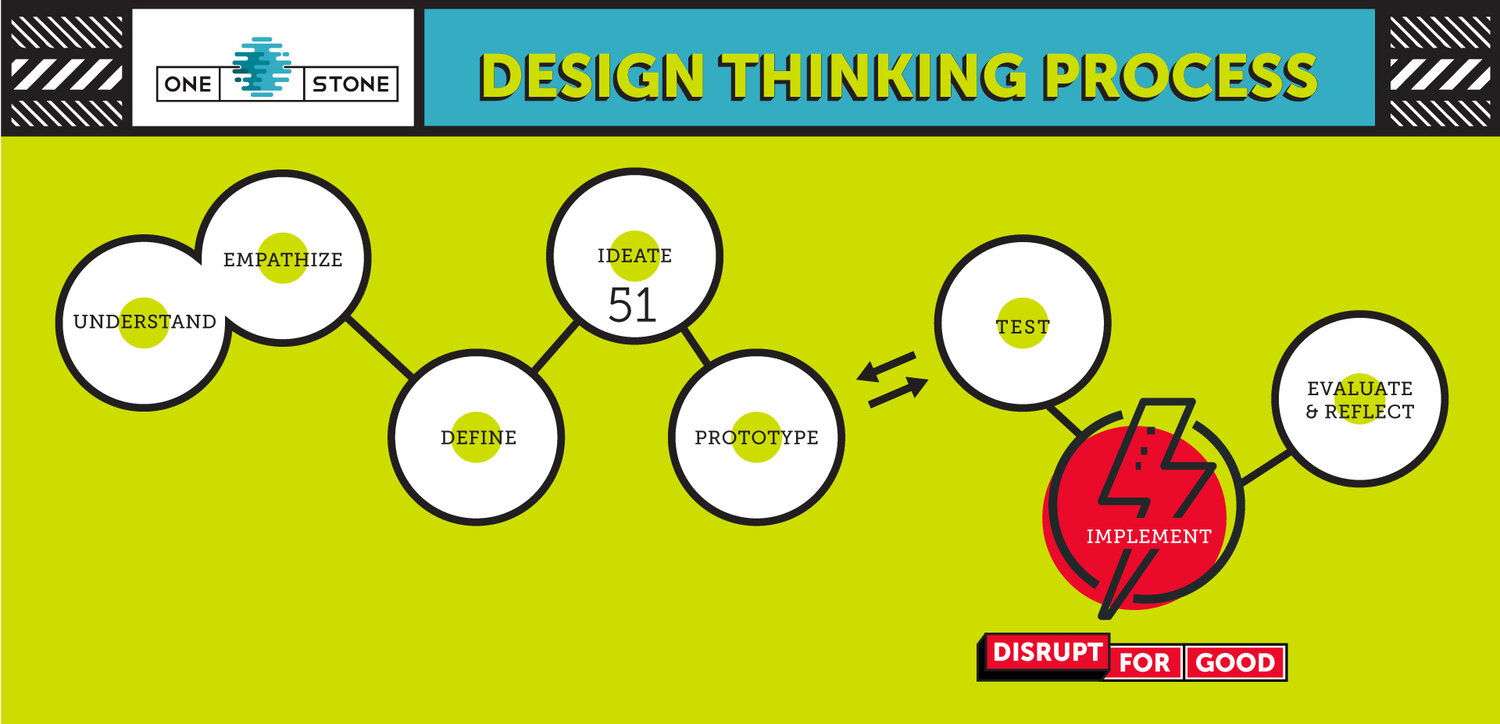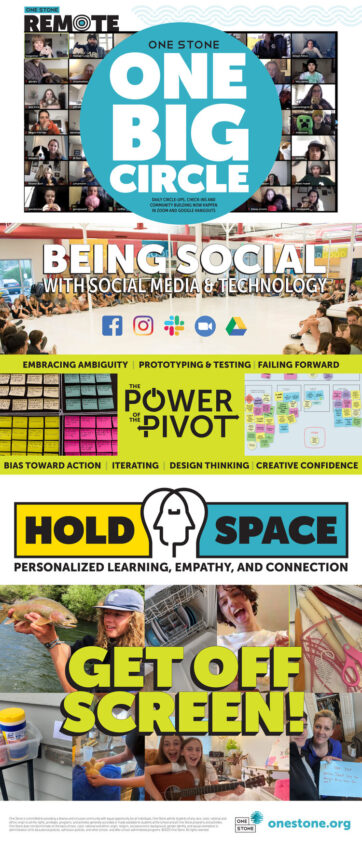One Stone, One Community: How One of the Nation’s Most Student-Driven Organizations Is Thriving During the Coronavirus Crisis

Few of us in our lifetimes have witnessed the degree of global uncertainty and ambiguity we now face as a result of the coronavirus pandemic.
Educators are being forced to adapt fast. But the shift to remote learning has been relatively seamless for One Stone, a nonprofit that empowers high school students through student-driven after-school programs and its innovative Lab School in Boise, Idaho.

One Stone’s core values are identified and nurtured by youth, with youth. When our community works together, these values are at the heart of our experiences and action. As an agile organization focused on transformational, no-cost opportunities for youth, we believe these values inspire youth to be prepared in life and use their voice.
Responding to the Crisis
One Stone closed its building on Friday, March 13, 2020. On Monday, as students continued their work from home, One Stone staff spent the day planning and preparing for the new learning environment. By Tuesday, One Stone Remote was underway, as learners checked in with their advisors and coaches via Slack, Google Hangouts, and Google Classroom.
Some planned projects required major changes, while others simply needed a few adjustments to account for the new, socially-distanced normal. But all in all, students continued learning and exploring in much the same way as they had while in the same physical space together at One Stone headquarters in downtown Boise.
In fact, the nonprofit’s quick transition from face-to-face learning to the launch of One Stone Remote has spawned the use of a new phrase within its community.
The power of the pivot.
The phrase has come to represent One Stone’s ability to adapt to adversity and embrace ambiguity, as its learners and coaches pivot to physically-distanced, transformative learning experiences. The organization’s focus on 21st century skill development empowers the entire One Stone community, including learners and coaches, to be agile and equipped for a rapidly changing economy, and that includes a remote working environment.
One key to much of One Stone’s 12-year success is its student-driven culture and highly supportive community that meets students where they are in terms of their personal curiosities and passions, as well as their social-emotional and physical wellness.
“When we were preparing to go remote, we all agreed as coaches that the student still comes first – even if that means changing course entirely,” said Michael Reagan, a One Stone coach and director of One Stone’s in-house creative studio,Two Birds. “We knew going remote was going to change a lot of things, but their wellness, their happiness, their individual learning goals, and our sense of community still had to be paramount.”
“It has been difficult not physically being in the same space with my peers and coaches because that is something I really enjoy and value as part of my day to day life,” explains One Stone learner Kayla Klein. However, she has adapted to the shift, and feels the support of her peers and coaches on a daily basis through regular video calls and messages, as well as collaborative, yet socially-distanced events, such as Do Good Day.
“To know that I am not alone is very comforting,” says Klein. “It makes me realize how much people truly care in our One Stone community and how strong we are.”
One Stone has adapted its spring learning experiences to conform with the State of Idaho’s stay-home order, and some have transitioned more easily than others. Experiences that were centered around physical proximity or specific equipment, such as the tools and supplies within One Stone’s Foundry, have been either set aside for a later date or shifted to focus on in-home creativity. In other words, One Stone learners and their coaches are asking a fundamental “How Might We?” question on a regular basis: How might we continue to create, learn, and collaborate safely in our own homes?
Quite a lot, it turns out.

One Stone’s work is rooted in design thinking, a creative problem solving and innovation discovery process developed at Stanford University’s d.school. Learning at One Stone’s no-cost lab school experience is focused on design thinking methodologies as well as passion-based, human-centered learning experiences that are designed by students. This foundation engages real world, relevant learning opportunities that contribute to sustainable change for good in communities and in the students who are trusted to use their voice now and not someday.
For example, students who were planning to explore the performing arts have pivoted to the production of a weekly, YouTube-based show called One Stone TV that features brief updates, humorous sketches, films, alumni spotlights, and artwork produced by students. Another group of students is exploring ways to connect with others in the community to reduce feelings of loneliness and isolation, by writing letters, sharing videos, and making music. Other students are embracing the unique opportunity to stretch their imaginations and writing skills in their own personal spaces, from their bedrooms to backyards, during an immersive creative writing experience. Each writer sets their own high word count goal between 10,000 and 25,000 words and writes continuously throughout the month, focusing on exploring their own self-expression and creativity. An immersion in environment science called, “Snow What?,” widened its focus to be “Snow What Do You Want To Learn Now?”
Those are just a few of many ways students continue to explore, grow, and connect.
One Stone Remote also includes experiential service, entrepreneurial, and blended learning experiences in mathematics, physics, technology, coding, cyber security, engineering, philosophy, world language, social science, art, design, music, and photography.

“One Stone has always empowered students to explore what interests and excites them most, in rigorous, professional, and personal ways,” says Allison Parker, Lab School Co-Director. “We have found that our commitment to deep and meaningful relationships between coaches and learners is the key to students unlocking and pursuing their passions. In our current situation, we have continued to emphasize these connections. Since we’ve gone remote, the only thing that has changed in our model is the environment.”
In many ways, the pivot to One Stone Remote is another example of the organization’s culture of flexibility, curiosity, and student voice. And judging by student response, it’s working.
“One Stone couldn’t be doing things better,” says Dante Chandler-Haas, a One Stone student. “We might be the closest held community in the nation right now. We all have the power to see each other’s faces and hear each other’s voices. We’re in this together and we are continuing to learn and grow.”
Because One Stone has always been based on close, personal connections between peers – as well as coaches and students – the connections that existed before the coronavirus crisis are now a lifeline of support that lifts, encourages and empowers the One Stone community to continue its mission of making students better leaders and the world a better place.
Moving forward
Ultimately, there is no way to predict how One Stone will adapt to the crisis during the months ahead, but one thing is for sure – it will.
Because the One Stone community is constantly iterating, embracing change and welcoming the input of learners, what the organization looked like six months or a year ago is not what it will look like next month or even next week. That has always been the case, and it’s even more clear now.
In a world where uncertainty is the only thing we can count on, embracing ambiguity is the only way forward – especially when we let our students take the lead.
One Stone Resources
Student Voice + Work
Project FLIP: Kylie’s Reflection
Suppressing Suppression: Empowering Student Voice
Pet Therapy: A Fall 2019 Dlab Case Study
Apart, Together: 5 ways to keep connected during remote learning
- Circle-ups and check-ins. Before the coronavirus crisis, One Stone’s Lab School ended each day with a Big Circle – an end-of-the day wrap-up including team games and community-building activities. Now, the lab school wraps up every day with One Big Circle via Zoom. Advisors also touch base with each One Stone learner on a daily basis to discuss overall well being, not just lab school needs.
- Social media channels. One Stone’s Facebook and Instagram accounts are showcasing all the many ways learners continue to innovate and explore, keeping them connected to each other and to One Stone supporters in the greater community.
- Embracing the Power of the Pivot. Learners are always empowered to develop new ideas for connecting and learning, especially now. Project Good teams that had planned in-person activities have pivoted to online meet-ups that align with their original goals and objectives. The Empow[HER] Project Good Team held an in-person workshop for seventh and eighth grade girls before a statewide stay-home order was issued in March, and the second two workshops were hosted via Google Meet in April. Online workshop activities included scavenger hunts, picnics, dance parties and the making of gratitude jars. Other events, such as Peeps on the Street, have pivoted to become Peeps on the Screen – a series of YouTube prototype presentations on this spring’s DLab projects.
- Empathy and holding space for each other. Empathy has always played a key role in One Stone’s culture. Now it’s more important than ever. Learners are regularly encouraged to share their challenges and successes with each other and their coaches. Many students report that they are embracing the importance of connection via email, text message or phone/video calls and continuing to reach out to their peers. Family members and siblings who may not be having the same type of learning engagement throughout their days are also being invited to virtual activities, learning experiences, and our continued after-school options like Project Good and Two Birds.
- Closing the computer and getting off-screen. Video calls and discussions are a key element of One Stone Remote, but learners are encouraged to complete their work independently and off-screen when possible. Activities are designed to take learning outside, whether in backyards or during socially distanced neighborhood walks. Because One Stone’s annual spring trips were cancelled, the organization will now host its first ever Trail Mixer – a day intended to promote wellness, outdoor time, and connection in the community, through explorations of gardening, music, crafting, survival skills, nature art, and journaling.
Shannon Reagan is a freelance writer and One Stone content contributor based in Boise, Idaho. Michael Reagan, co-author, is a coach and director of Two Birds at One Stone in Boise, Idaho.
Transcend supports communities to create and spread extraordinary, equitable learning environments.

